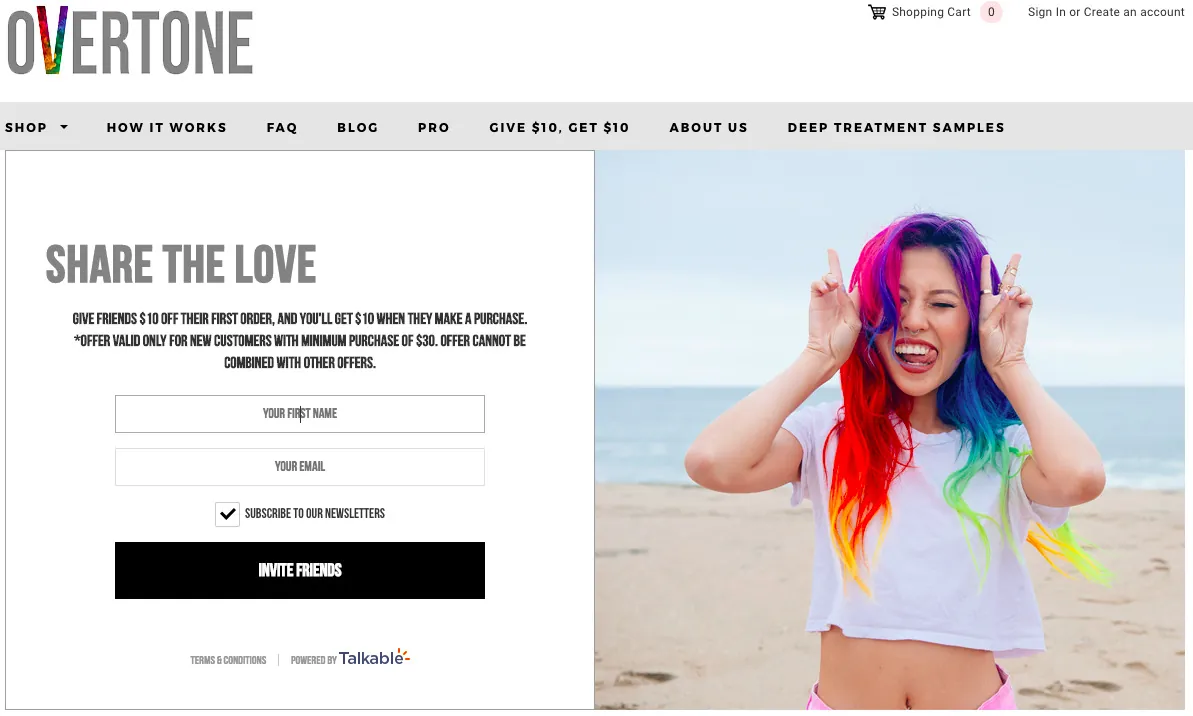Many people mistake referral and affiliate marketing for each other. While they are both growth strategies that share some similarities, they are fundamentally different in how and why they are executed. Depending on the goals and structure of a business, they may be better suited to one approach over the other. Read on for an overview of how these approaches to growth and customer acquisition differ.
What Are Referrals?
Referrals, also known as referral marketing or refer-a-friend campaigns, are a marketing strategy which revolves around the idea of the good old word-of-mouth marketing. If a business sells something which people love to recommend, it can encourage customers to make recommendations more often in a way that benefits all parties involved.
Referral marketing software like Talkable makes it possible for businesses to incentivize customers to share their personalized referral links with friends and family, use customized messages and designs, as well as analyze and improve referral campaigns just as one would with any other managed marketing channel.
Because people typically trust their peers’ recommendations more than marketing and advertising from brands themselves, referral marketing can be highly effective. By tapping into real social circles, brands can empower customers who already love a product to share that excitement with their friends. New customers who enter a brand’s ecosystem have the opportunity to participate in referral programs if they also enjoy the product, further extending the brands reach exponentially.
How a Typical Referral Program Works

Let’s look at how referral campaigns work step-by-step:
- Billy buys a pair of jeans from a store and loves them.
- Along with Billy’s purchase, the business sends him a referral offer: If he shares his referral link with his friends, they will get a $15 discount on their first purchase. Once the friend’s purchase is complete, Billy would also receive a $15 coupon.
- Billy’s so happy about his new awesome jeans, he wants to tell all his friends about them. With the knowledge he has about the referral offer he has a true incentive to share with others in his network how much he likes his jeans.
- He sends his friend Mark a link to the store, telling him, “I just picked up a pair of these jeans and I am loving the fit and quality. You might want to check them out!”
- Mark follows the link Billy sent him and purchases from the store using the $15-off deal.
- Billy receives an email from the business with the $15 coupon he was promised. He uses it on another great product from the business, reinforcing his positive relationship with the brand. This also gives him more knowledge to utilize if he has another friend in mind who might be interested in the brand’s products.
What Is an Affiliate Program?

Affiliates are people who earn money through their own websites or as independent marketers. They place either ads or other marketing content on their websites or run paid advertising campaigns that lead to an online store or sales pages. This is typically more of a broad approach to attracting new customers, rather than a targeted one.
Affiliates’ motivation to promote any business is solely money. They get paid for sending customers to a website that belongs to their partner. In other words, starting an affiliate program is similar to outsourcing marketing campaigns to hundreds of independent contractors.
The challenging thing about affiliate marketing is that (in most cases) anyone can participate in the program. This means that a business will not have much control over where and how their products are advertised. When trying to build a reputable brand that will last, this marketing channel needs to be approached carefully.
Referrals vs Affiliates: Key Differences
Now that we know how each type of marketing program works, let’s compare their pros and cons.
| Referral marketing | Affiliate marketing | |
| Who does the promoting? |
Verified customers | Any independent marketers or webmasters who enter an affiliate agreement |
| Who do they promote to? | Their network, friends, family, and coworkers | Whatever audience they have access to |
| How they promote? | Share their experience and recommendations via social media, emails, messengers | Paid ads, content marketing, spam |
| What’s their motivation? | To share good products with people who’d love them too and to get their own discounts | Money |
| Easy to control? | Yes | No |
Referral Marketing: Pros & Cons
Pros:
- One of the best practices in marketing is to leverage an existing customer base.
- New customers who come to a business through referrals tend to have higher LTV and are more likely to become advocates themselves.
- Easy to run, manage, analyze, and adjust.
- Since a business is in charge of all marketing activities (including the referral program) and assets, they do not have to worry about their brand reputation being affected by others.
- A business can combine their referral partner program with influencer marketing activities for increased (yet still controlled) reach
Cons:
- A referral marketing program will not be highly effective if a business does not have many customers or if their product is not well-received or often recommended organically by the current customer base.
Affiliate Programs: Pros & Cons
Pros:
- Has the potential to deliver many relatively cheap leads.
- The business does not have to manage marketing efforts internally and can be relatively hands-off in the process.
- A business can choose to pay only for the agreed action (such as registration, lead forms, purchases, etc.).
Cons:
- A business cannot control where and how their products are advertised.
- Affiliate traffic often turns out to have very low purchase intentions.
- The sales team may end up wasting their time on low-quality leads.
- There is an inherently higher risk of fraud.
Which Program Is Best For You?
- They already have many happy customers and are interested in leveraging them to increase referral revenue.
- The brand’s reputation is especially important and needs to be handled with consideration.
- People love the product(s) being offered and already recommend the business to their friends.
- The business cares about long-term profits and KPIs over short-term boosts.
- They want to incorporate another manageable marketing channel into their overall strategy.
Signs a business should go with affiliate programs
- They sell a low-dollar product that is often bought spontaneously.
- The brand prioritizes volume over product or experience quality.
- The brand does not have an established or engaged customer base.
- The customers that a business does have do not feel compelled to naturally recommend the product(s) often.
- They do not want to manage, analyze, or adjust their marketing campaigns and would rather pay others to do that.
While both affiliate and referral programs have their place, we believe that referral marketing can provide higher quality long-term results for the right type of business. If customers are already acting as ambassadors for a brand, it is a great strategy to incentivize that behavior to increase its effectiveness.
Thinking about what referral program software to choose? We can help you with that! Contact us here.





